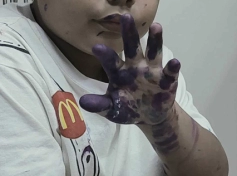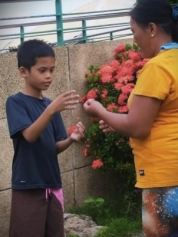Posts By: Counseling Department›Show All
"The Bow and the Arrow"
Children are explorers. Curiosity often leads them to peek  inside the doorknob's key hole; enthralls them to touch a squealing kettle; and ferry their feet into places where they are not allowed to be. Often, boundaries are broken.
inside the doorknob's key hole; enthralls them to touch a squealing kettle; and ferry their feet into places where they are not allowed to be. Often, boundaries are broken.
Children are expressive. Emotions often steer their ship as they navigate their social world. They jump, giggle, grin, and laugh when happy. A frown, a downturned face, and a shoulder-drop paint their sadness. Talking back, kicking the wall, shutting down, spitting, throwing things, and crying are the easiest cards to pull out when they are angry. Often, adults' patience is challenged.
Children, most of the time, do not listen, nor take heed of instructions and reminders; they have a loose grip of morality that even memory verses fall short of reminding them to be good. But this does not mean we stop teaching them to be kind. This is to remind us that children are fallible and that they do not have the skill sets to fully self-manage; even adults have difficulty regulating themselves, too. And children who misbehave a lot are often painted with a different color palette, viewed as a problematic child.
 At CSC, children do not only go through these developmental obstacles. They are also bringing with them their adverse experiences. For some children, this baggage magnifies their difficulty to self-regulate. Without a proper lens, dealing with these children might be quite challenging. As adults, the common response is to control these behaviors but with the aid of Trauma Informed Care, houseparents, caregivers, and other staff have a better understanding of the underlying factors of such behaviors. Rather than seeking control, comfort is offered. Rather than spending time preaching the rules and whatnots, cultivating a relationship is the focus. Rather than seeing the child as problematic, the child is seen as a work in progress, still growing to reach his/her full potential, and to give the child a chance to lead a more meaningful life. Through Trauma Informed Care, we are always reminded with how Khalil Gibran viewed how children should be guided. In his poem, he said:
At CSC, children do not only go through these developmental obstacles. They are also bringing with them their adverse experiences. For some children, this baggage magnifies their difficulty to self-regulate. Without a proper lens, dealing with these children might be quite challenging. As adults, the common response is to control these behaviors but with the aid of Trauma Informed Care, houseparents, caregivers, and other staff have a better understanding of the underlying factors of such behaviors. Rather than seeking control, comfort is offered. Rather than spending time preaching the rules and whatnots, cultivating a relationship is the focus. Rather than seeing the child as problematic, the child is seen as a work in progress, still growing to reach his/her full potential, and to give the child a chance to lead a more meaningful life. Through Trauma Informed Care, we are always reminded with how Khalil Gibran viewed how children should be guided. In his poem, he said:
"...You may give them your love but not your thoughts,
For they have their own thoughts.
You may house their bodies but not their souls,
For their souls dwell in the house of tomorrow, which you cannot visit, not even in your dreams.
You may strive to be like them, but seek not to make them like you.
For life goes not backward nor tarries with yesterday.
You are the bows from which your children as living arrows are sent forth.
The archer sees the mark upon the path of the infinite, and He bends you with His might that His arrows may go swift and far.
Let your bending in the archer's hand be for gladness;
For even as He loves the arrow that flies, so He loves also the bow that is stable."
Khalil Gibran, excerpt from On Children






